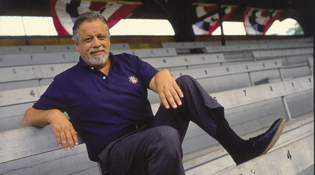 loading
loading
Sporting LifeThe story of “Green Fields of the Mind”Bart Giamatti’s bittersweet ode to baseball.  Brad TrentA. Bartlett Giamatti ’60, ’64PhD—seen here at Doubleday Field in Cooperstown, New York, before the 1988 Hall of Fame Game—expressed the dream of an everlasting summer in his 1977 essay. View full image“It breaks your heart. It is designed to break your heart.” When Boston Red Sox fans hear those words on the radio, it means one thing: once again, the baseball season is over. Every year, after the final out, Red Sox radio announcer Joe Castiglione reads a portion of “The Green Fields of the Mind,” an account of the last day of the 1977 Sox season, by former Yale president A. Bartlett Giamatti ’60, ’64PhD. More than one listener has been known to shed a discreet tear. The essay, first published in this magazine 35 years ago, has become a bittersweet staple of baseball literature. Giamatti was a lifelong Red Sox fan who became commissioner of Major League Baseball after retiring as president of Yale. In “Green Fields” he describes his emotions during the radio broadcast of that game in ’77: the Sox are about to tie Baltimore, and a win will let them extend their season into the playoffs—and if they do, “the summer will not pass.” For Giamatti, as long as the Sox can keep playing baseball, “school will never start, rain will never come, sun will warm the back of your neck forever.” But something darker is on Giamatti’s mind; this is his 40th summer, he writes, and “there comes a time when every summer will have something of autumn about it.” In the end, Baltimore wins, and the summer is over. “The Green Fields of the Mind” has become a favorite of journalists and others who love to wax romantic about baseball. Before a reading of the piece in 1989, Giamatti told the story of how it first saw print in 1977 in the Yale Alumni Magazine. He was secretary for his college class, and one afternoon when “I had absolutely nothing to say about my classmates,” he wrote “Green Fields” instead, and submitted it as class notes. The piece was, in his words, “properly and immediately” rejected as unsuitable for the class notes section. But two months later, when he became president of Yale, it was resurrected for use in the magazine’s op-ed section. “He thought it was just fluff,” says his son Marcus Giamatti ’87MFA, an actor who also writes about baseball. “He’d be flattered, and sort of shocked, to know how popular it’s become.” Roberto González Echevarría, the Sterling Professor of Hispanic and Comparative Literature, says the essay sounds like the Giamatti he remembers. “We’d meet in the street,” says González Echevarría, who played semipro baseball himself, “and he’d always be lamenting the Red Sox. I’d say, ‘You Red Sox fans have only one mode of discourse: lamentation. What will happen when they win?’ It is this gloom that permeates that essay.” Giamatti spent three years as president of the National League and five months as commissioner before dying of a heart attack on September 1, 1989, at the age of 51. His untimely death made the theme of mortality in “Green Fields” especially poignant. To Castiglione, a New Haven native whose family knew Giamatti’s, the piece has a universal appeal. “I get a lot of response from listeners,” he says. “It’s meaningful, especially for Red Sox fans, who’ve had such a lot of heartbreak.” In recent years, of course, the Sox’s fabled curse—their prolonged inability to win a World Series—has been broken; they won the Series in 2004 and 2007. “It’s too bad Bart couldn’t have been around for the world championship,” says Castiglione. But could Giamatti have accepted a summer with a happy ending, stretching all the way to a World Series triumph? “He would have waxed poetic about it,” says Castiglione. “He would have found a way.”
The comment period has expired.
|
|